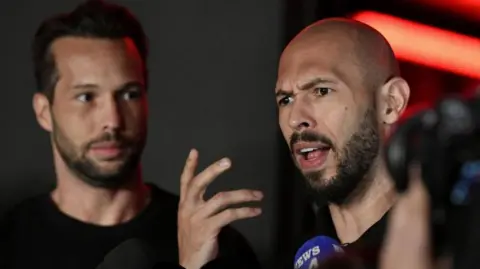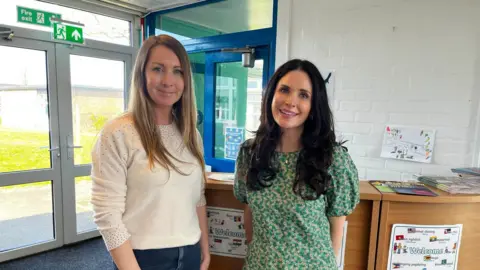'Boys formed Andrew Tate club in school' - teacher
 Getty Images
Getty ImagesChildren as young as seven are being given smartphones, with some primary school pupils consuming harmful misogynistic content, a headteacher has said.
Sophia Dover, headteacher at Cheriton Primary School near Folkestone in Kent, says the school is to support campaigners by implementing a smartphone ban in September after problems with pupil WhatsApp groups and social media sites such as Snapchat.
She is calling for a national ban, citing examples from another school where pupils set up an "Andrew Tate club", based on the self-styled misogynist, after consuming harmful content on social media.
A government spokesperson said it had issued "clear guidance" to teachers on restricting phone use.
'Scared for the future'
Ms Dover, who has been headteacher at the school for two years, said WhatsApp groups were "another way that bullying can happen".
"We have had children who have got themselves in a right state because they take their phones to their bedrooms and are sending messages at three o'clock in the morning," she said.
"I'm really scared for the future. The thought of my seven-year-old having a phone is absolutely petrifying."
 Reuters
ReutersThe headteacher said issues with social media had occurred with children as young as seven, in Year 3, while peer pressure for parents to give their children smartphones was commonplace by Year 5.
She added that the school had been forced to take into account whether implementing a smartphone ban would affect its Ofsted inspection over fears it could negatively impact parents' perception of the school.
Discussing the decision to implement the ban, she added: "We were due Ofsted, and it shouldn't be the case, but it can make or break a school.
"Parent questionnaires are looked at in great detail and Ofsted could stop school places being filled."
'National conversation is changing'
Calls have been growing for a government ban on smartphones for children under the age of 16, with some parents signing a "smartphone free childhood pact" as part of community action to enforce a self-imposed ban.
Felicity Winkles, who leads the Smartphone Free Childhood movement in the South East, said the group had seen a spike in support since the release of Adolescence on Netflix.
 Anisa Kadri/BBC
Anisa Kadri/BBC"Our mission is to bring families together to change the culture around smartphones," she said. "Resisting peer pressure becomes almost impossible.
"Parents feel they have to give their children a smartphone because everyone else is. You are not just giving them access to the internet – you are giving the internet access to them."
Ms Winkles said the movement, started in 2024, had seen thousands of additional signatures for its pact since the release of the show.
Adolescence writer Jack Thorne has also publicly backed the campaign.
 Netflix
NetflixShe added that the move came after realising children could still access harmful content on the internet despite parental control, which should stop such content being seen by children.
The movement also advocated the use of "dumb phones" – devices which do not have access to the internet, social media or other smartphone functions.
Children 'happier after ban'
Schools across the country are now wrestling with ways in which to ban smartphones on their campuses, with some headteachers deeming current bans "ineffective".
One method advocated by some schools included magnetically locked mobile phone pouches which cannot be accessed until the end of the school day.
Damien McBeath, headteacher of John Wallis Academy in Ashford, said the school had implemented the pouches in January, which had a "huge" positive impact.
He said: "We have seen attention in classes improve and a reduction in online abuse and bullying.
"Children are reporting being happier and teachers are becoming less stressed and the quality of their work is improving."
Mr McBeath added that he advocated a ban on smartphones for children under the age of 16, adding he "didn't see why" any child under that age would need one.

Calls for a government ban had gained traction following the release of Netflix's Adolescence, which examines the effect of social media in schools.
Prime Minister Keir Starmer welcomed the announcement from Netflix that the show would be made available for schools to watch for free.
The programme has sparked a national conversation about the impact of social media and "manosphere" influencers.
A government spokesperson said: "Mobile phones are a distraction from learning, which is why our clear guidance sets out that school leaders should be restricting their use.
"Around 97% of schools already restricted mobile phone use in some way even before the guidance was introduced, while headteachers also have the ability to implement complete bans, with many choosing to exercise this right."
Follow BBC Kent on Facebook, on X, and on Instagram. Send your story ideas to [email protected] or WhatsApp us on 08081 002250.
